Jump to:
Is coconut oil good for your hair or overhyped? We explore how coconut oil affects different hair types, who should use it and avoid it, and a few common ways to use coconut oil for hair health.
Is Coconut Oil Good for Your Hair?
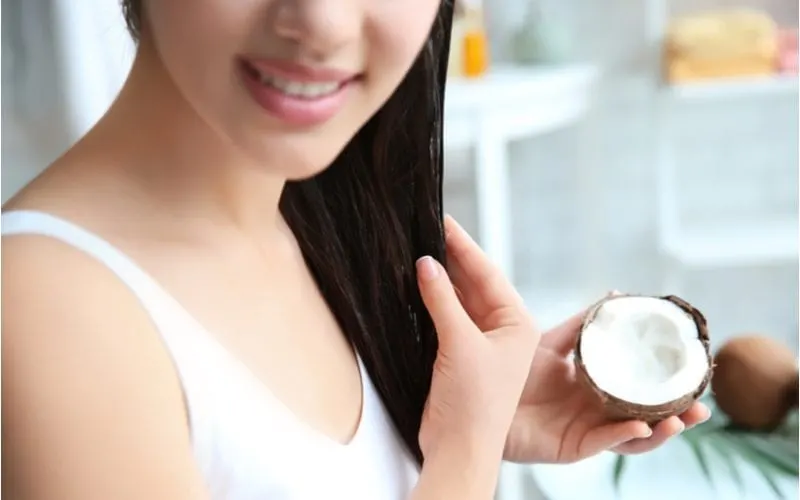
New Africa/Shutterstock
Coconut oil has become the go-to treatment for common hair woes. Dry scalp? Slather some coconut oil on it. Brittle, split ends? Coconut oil should take care of it. Hair lacking luster, strength, or volume?
You see where we’re going with this.
Coconut oil is widely regarded as some kind of miracle moisture tonic for hair. We were curious if it’s really as good for hair as it’s made out to be.
It’s not that we’re cynical. It’s clear that coconut oil can be beneficial for certain hair types and conditions. But while coconut oil is promising for some, it’s a heavy oil that can easily overwhelm finer hair.
Used on the wrong type, it can actually be harmful for hair.
Before you trust your strands to this tropical oil, you need to know if it’s going to help or hurt your hair. In this guide, we’re going to dive deep into coconut oil’s effectiveness on hair.
We’ll look at what’s in coconut oil, the benefits and disadvantages of using coconut oil on hair, the hair types that should use it, who should avoid it, and a few ways you can use coconut oil for hair health.
So, is coconut oil good for hair? We’re going to find out. But first, you should know what coconut oil is.
Read Next: What Oil Is Best for Hair?
What Is Coconut Oil?
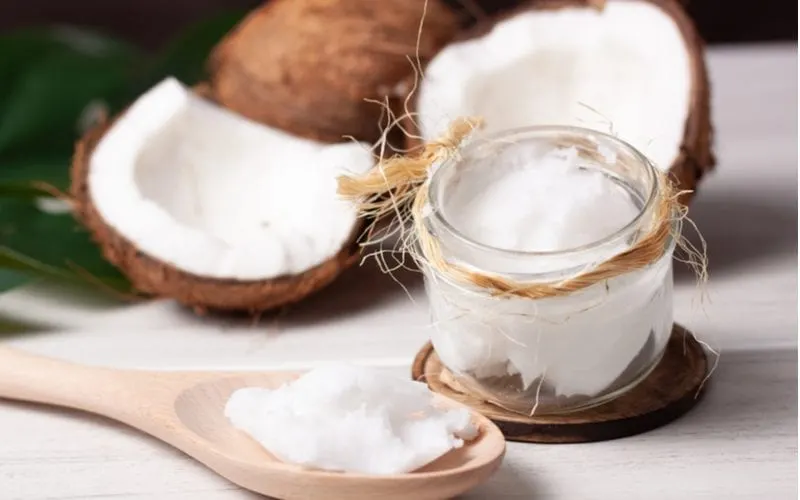
Miguel Angel Gomez Ramos/Shutterstock
Coconut oil is a mild, slightly sweet oil that is extracted from coconuts (the fruit of the coconut palm tree). You’ll see both refined and unrefined varieties of coconut oil.
Refined coconut oil doesn’t have the characteristic sweet taste or scent because it’s bleached and deodorized in processing. Unrefined coconut oil is the type most commonly used for hair.
Unrefined coconut oil is virgin, unprocessed, and made from fresh coconuts. Coconut oil contains few vitamins and minerals, but packs a hefty dose of fats. You’ll notice that, like bacon grease, coconut oil is solid at room temperature.
It quickly melts when it rises to around 78 degrees Fahrenheit. That’s because around 80-90% of coconut oil is saturated fat.
Coconut oil contains lauric acid, which isn’t great for ingestion (it leads to high cholesterol). But it does have antimicrobial properties when it’s applied to the skin or scalp. It kills bacteria, fungus, and microbes that can cause infections or disrupt the skin’s natural biome.
With these types of properties, you can see why coconut oil has become a go-to treatment for hair and scalp issues that range from dryness to dandruff. Let’s take a closer look at some of the proven benefits and disadvantages of using coconut oil on hair.
Pros of Coconut Oil for Hair
The widespread belief that coconut oil is good for your hair is due to how many benefits it can offer for certain hair types. Let’s look at some of the top proven benefits of using coconut oil for hair.
Adds Shine and Luster
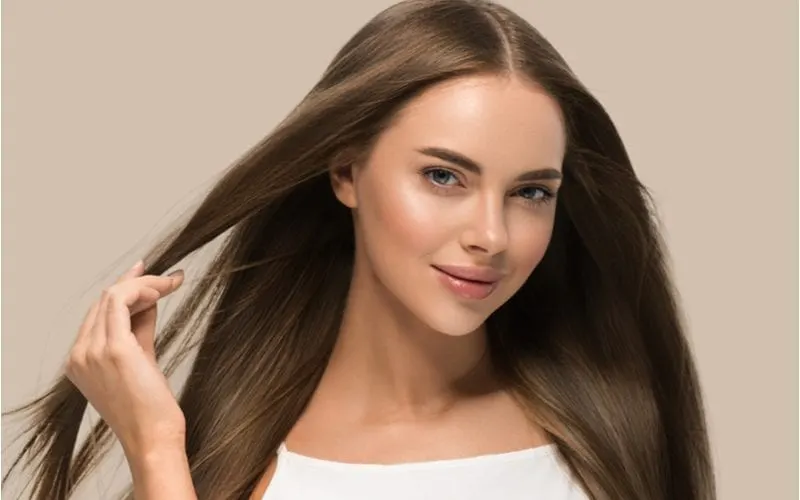
Irina Bg/Shutterstock
Like other oils, coconut oil makes hair shiny and lustrous. It coats strands with a matrix of nourishing medium chain fatty acids (MCFAs). In fact, it’s the richest natural source of medium chain fatty acids.
These MCFAs cling to strands and help reflect light, making your hair appear shiny and healthy when applied in the right amount.
Penetrates Hair Shaft to Hydrate Strands
Coconut oil is one of the best for hydrating dry hair because of its ability to actually penetrate the hair shaft. The molecular structure of coconut oil makes its molecules the perfect size and weight to slip under the outermost layer of the hair, the cuticle layer.
This brings hydration and moisture deep into strands. Other oils just sit on top of the hair and act only as a sealer for moisture. Coconut oil can both deliver the moisture and seal it in.
Seals in Moisture

Puhhha/Shutterstock
Coconut oil creates a physical barrier over each strand of hair, preventing the moisture loss that normally occurs. This is especially beneficial as a moisturizing treatment for anyone with chronically dry hair.
And since coconut oil also penetrates the hair shaft to hydrate deeper layers of each strand, it does double duty. It both hydrates and locks the added moisture into the hair.
Nourishes Damaged Hair
Damaged hair can be dull, tangled, and brittle with split ends and breakage. Coconut oil envelopes damaged hair in a nourishing cocktail of fatty acids that give it flexibility, moisture, and shine.
Studies have shown it works better than sunflower or mineral oil because it is able to penetrate the hair shaft. Coconut oil also helps provide a physical barrier that protects damaged hair from the elements and additional damage.
Defines and Tames Curls

Beauty Stock/Shutterstock
Curly hair can really benefit from coconut oil. By infusing the hair with lots of additional moisture, it encourages curls to take their natural shape and enhances their definition.
With less frizz due to adequate moisture in the hair, curls look defined and shapely with coconut oil. The application of coconut oil on curly hair reduces flyaways and frizz that can make curls look messy.
Reduces Protein Loss
Coconut oil is the only oil known to reduce normal protein loss, or weathering, of hair. Over time, the hair shaft is exposed to elements, chemicals, and stress from styling that erode the protein-based layers of the hair and result in protein loss that makes the hair weaker.
Fissures, gaps, and ridges form on the outermost layer of the hair (the cuticle) that lead to increased tangles, dull appearance, and breakage. But coconut oil reduces the normal protein loss that occurs in hair. This protects it from damage and keeps hair more manageable and soft.
Antimicrobial Properties

Jarun Ontakrai/Shutterstock
Coconut oil has been proven to be an effective antimicrobial substance. It kills bacteria, fungus, and microbes that can harm the scalp and skin. The scalp’s natural microbiome consists of good bacteria and fungus living in harmony.
Combined, these two keep bad microbes at bay, but sometimes, they get overwhelmed and scalp infections or issues occur. Using coconut oil on the scalp gives you the edge when this happens.
It can protect against common scalp issues like dandruff, which is caused by bacteria species like Malassezia, Propionibacterium acnes, and Staphylococcus epidermidis.
Cons of Coconut Oil for Hair
It’s sounding more and more like coconut oil is good for your hair. But before you slather some on, let’s take a look at the disadvantages of using coconut oil in hair. It’s not always a good idea.
Bad for Some Hair Types
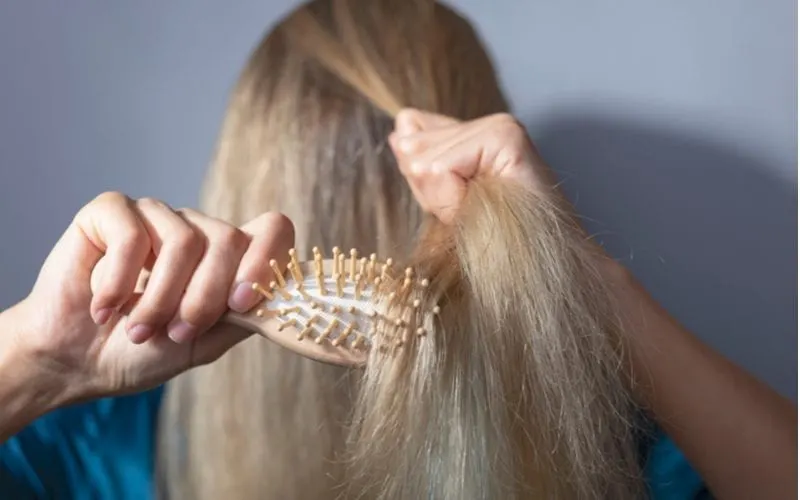
Donenko Oleksii/Shutterstock
Some hair types just don’t mesh well with coconut oil. It’s nourishing and hydrating, but it’s a heavy oil that can easily overwhelm fine hair and weigh it down.
Coarse, dry hair also struggles with coconut oil. Since coarse hair is rich in protein, coconut oil’s protein retention properties can result in too much protein locked into strands.
The result can be dry, brittle hair that easily breaks off. We’ll talk more about how each hair type responds to coconut oil in just a bit.
Promotes Buildup
Coconut oil does penetrate the hair shaft pretty well, but some of it sits on top of hair like a film. That oily film picks up a lot of buildup along the way.
And because coconut oil creates a seal over strands, there’s nowhere for the hard water minerals, product buildup, protein buildup, dirt, and natural sebum to go. Buildup stays anchored to your strands when coconut oil is in the mix.
Intense clarifying shampoos or an apple cider vinegar hair rinse can help mitigate the problem, but can be harsh on the hair when done too often.
Can Lead to Protein Overload
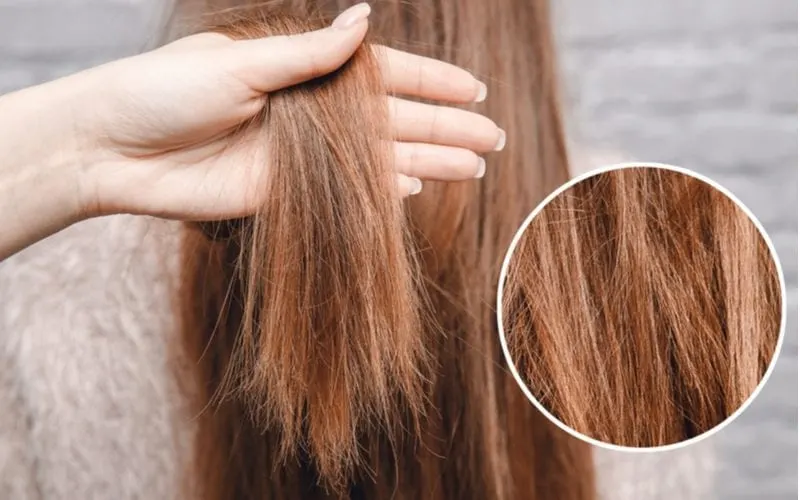
Parilov/Shutterstock
Coconut oil helps reduce protein loss in the hair, so less protein escapes when you regularly apply it. That’s a great thing for someone with damaged hair or those who don’t have enough natural protein in the hair shaft.
But for someone with normal protein amounts in the hair (like coarse hair), or anyone who uses protein-based hair care products, it can be a big problem. When too much protein builds up in each hair strand, they become dry, hard, and brittle. They start breaking off at weak points along the shaft.
Hair can become rough and straw-like when it’s overloaded with protein. Typically, this is a problem with anyone who has coarse, dry hair.
It’s a Known Allergen
It’s rare, but some people are allergic to coconuts and any products derived from them, like coconut oil. For this reason, we recommend spot-testing before using any coconut oil product. Stop using and talk to your doctor if you experience any type of allergic reaction or symptom.
What Hair Type Is Coconut Oil Good For?
Most hair types can use coconut oil in some form or fashion. But there are some hair types that perfectly mesh with the intense moisturizing and nourishing power of coconut oil.
Fine Hair

Nelen/Shutterstock
Coconut oil can be super beneficial for fine hair that is straight, wavy, or curly. It reduces protein loss to help bulk up fine strands and make them stronger and look thicker. It increases shine, reduces tangles, and protects against damage.
The problem is how heavy this oil is and the way it weighs down fine hair strands. If you have fine hair, you can sidestep this issue by applying a smaller amount, using it as a treatment and washing it out, or using lightweight products that have coconut oil as an ingredient.
Medium Hair

Alena Ozerova/Shutterstock
Slightly thicker in circumference than fine hair, medium hair strands are about the same thickness as a single thread. Like fine hair, medium hair that is straight, wavy, or curly can benefit from the protein loss reduction coconut oil provides.
It keeps strands from getting weathered to the point of damage, makes hair shinier, stronger, and more manageable.
Medium hair isn’t as easily overwhelmed by coconut oil as fine hair. Starting with a small amount to see how heavy it is on your hair can help ensure you don’t weigh your locks down.
High Porosity Hair
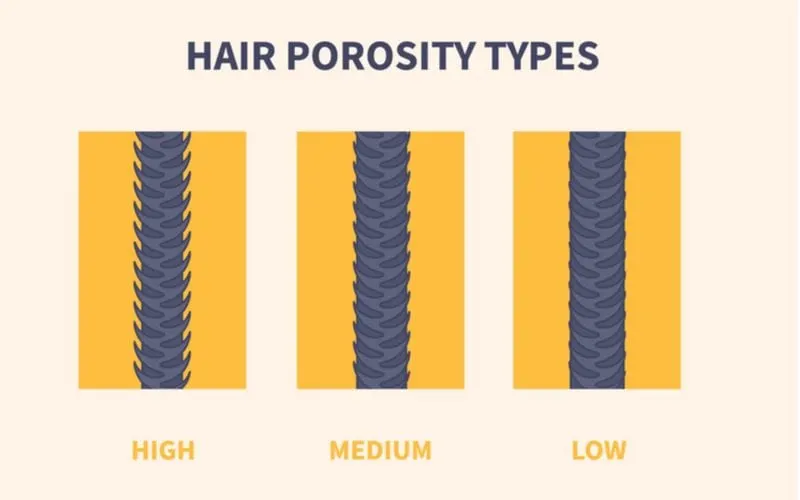
Art4stock/Shutterstock
Low porosity hair repels water along with oils, conditioners and products because the cuticle layer is locked down tight. High porosity hair, however, is the exact opposite. And it loves coconut oil.
There are more gaps and porous openings in the cuticle layer of highly porous hair. So, moisture is able to get in quickly but leaves just as fast. Coconut oil penetrates high porosity hair to deliver moisture deep into strands, then seals that moisture off so it can’t escape. The result is smooth, hydrated, soft hair.
Learn more about how to determine your own hair porosity here.
Curly Hair

Roman Samborskyi/Shutterstock
Curly hair definitely benefits from coconut oil when you have a fine or medium hair texture and medium to high hair porosity. It delivers moisture, locks it in, and helps curls (and waves) take their best natural shape.
Defined, shapely curls with no frizz or flyaways in sight? Check. Shiny, luminous hair that catches the light at every bend? You got it. Bouncy, hydrated curls with moisture locked in? Absolutely. Curls and coconut oil are a match made in heaven.
What Hair Types Should Avoid Using Coconut Oil?
There are some hair types that just don’t jive well with oil of the coconut variety. You may want to skip the coconut oil if you have low hair porosity, coarse hair, or dry, brittle hair.
Low Porosity Hair
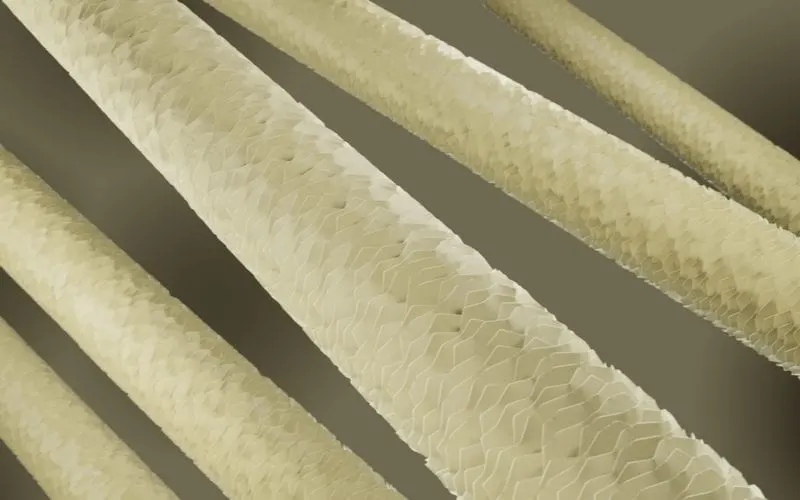
ART-ur/Shutterstock
Low porosity hair has a tightly-knit cuticle layer (the outermost layer of the hair shaft) that lays down flat. Any hair type can have low porosity hair – fine, medium, coarse, straight, wavy, or curly.
If you have low porosity hair, it’s resistant to moisture because the outer layer is locked down tightly. So you might think coconut oil would be a great way to get moisture to penetrate deeply into your hair.
Unfortunately, that’s not the case. Whatever you apply to low porosity hair has a tendency to just…sit there. Languishing.
The result is a lot of buildup, and when coconut oil is in the mix, the problem gets worse. Since coconut oil prevents protein loss, low porosity hair can quickly experience protein overload when using it.
Coarse Hair
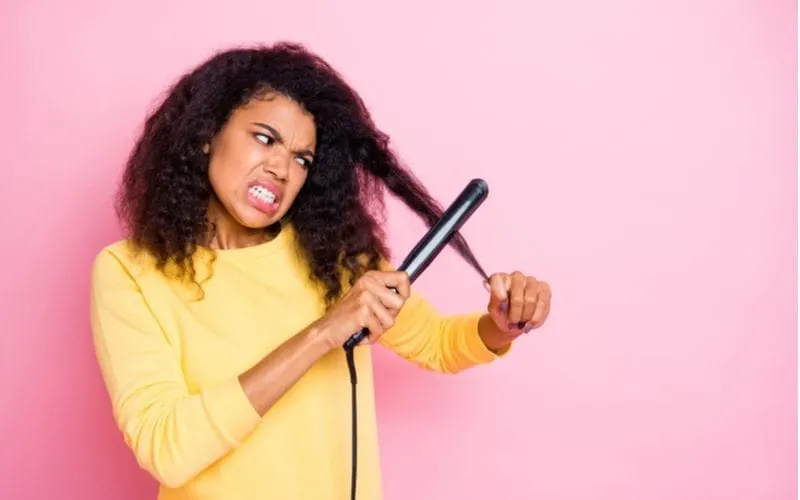
Roman Samborskyi/Shutterstock
Coarse hair seems like it would be a great match for coconut oil, but it’s not. Coarse hair has a substantial amount of protein in it because it’s much thicker than fine or medium hair.
We’ve talked about the ways coconut oil can lead to protein overload because it prevents normal protein loss. With coarse hair, applying coconut oil results in more protein on the hair than is needed.
When there’s too much protein, the strands lock up and become brittle, dry, and prone to breakage. This is why so many people who have tried coconut oil on their hair end up with hair that feels like straw.
Dry, Brittle Hair
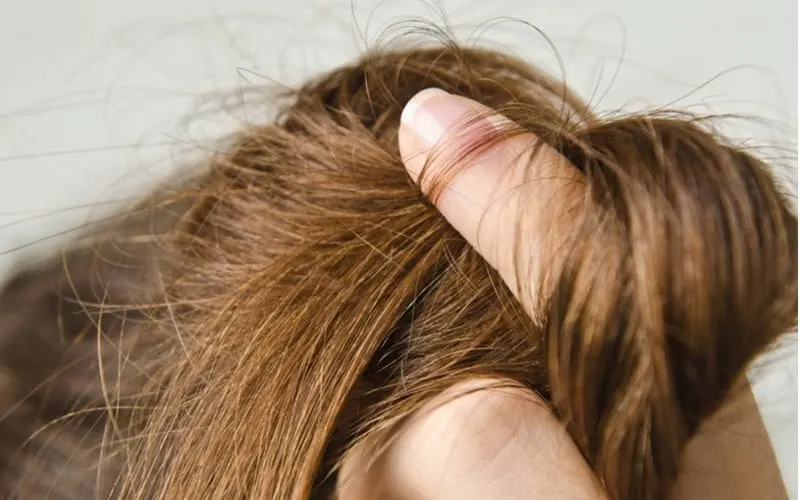
Rasulov/Shutterstock
If you have chronically dry hair that feels brittle, rough, or straw-like, you shouldn’t use coconut oil. Dry, brittle hair that feels hard is a symptom of protein overload. Coconut oil only worsens protein overload.
If you’re not careful, you could see a lot of breakage, split ends, and even hair loss. Instead of coconut oil, anyone with dry, brittle hair should opt for another nourishing oil like argan oil or marula oil.
These oils don’t reduce protein loss like coconut oil does. So you’ll get the moisture-enhancing benefits without the protein buildup side effects.
How to Use Coconut Oil for Your Hair
Is coconut oil good for your hair type? It’s great for fine, medium, curly, and high porosity hair. It’s better to avoid it if you have low porosity, coarse, or dry, brittle hair.
Now that you know if coconut oil is good for your hair, let’s look at some of the most effective ways to use it. These are our favorite coconut oil treatment techniques.
1. Heat and Treat
Coconut oil can be used for a nourishing hot oil treatment. Heat your desired amount of coconut oil in a saucepan on the stove until it is hot. Check the temperature again before applying it to your hair.
Use a wide tooth comb to comb equal amounts of hot coconut oil through your hair, then cover with a shower cap for a few hours or overnight. Wash it out when you’re done – it may take more than one shampoo to get it all out.
Alternatively, you can apply melted coconut oil to your hair and use a thermal deep conditioning cap to heat it slowly and gently.
2. Coconut Conditioner
Shampoo your hair like you would normally, then take a small amount of coconut oil and warm it in your hands to melt it. Apply to your hair in sections and comb it through with a wide tooth comb. You won’t need to rinse it out.
Avoid your roots if you have fine hair or hair that tends to get oily fast. Concentrate on the ends if you have split or brittle ends.
3. Coconut Oil Hair Mask
Apply coconut oil to your hair, thoroughly saturating each section. Work the oil in from the roots to the tips. Cover with a shower cap and set a timer for as long as you want – anywhere from 30 minutes to overnight.
When the time is up, wash it out thoroughly and follow up with a good conditioner.
More Coconut Oil Tips
Before you run off to try one of these coconut oil treatments, keep the following tips in mind!
- Start with a small amount. You can always add more if needed, but since coconut oil is heavy and can make hair look greasy, start with a small amount.
- Make it a cocktail. You don’t have to use coconut oil alone. Try also using other natural nourishing ingredients, like honey, olive oil, or yogurt on your hair for a truly delectable and moisturizing hair treatment.
- Opt for unrefined, virgin coconut oil. Refined versions are cheaper, but they don’t have the same benefits as pure, unadulterated coconut oil. Plus, they don’t have that characteristic sweet coconut smell!
- Melt before using. It’s hard to apply coconut oil properly when it’s in its solid state. Bring coconut oil up to about 78 degrees to melt it for easier use.
- Avoid the scalp (usually). Don’t try to slather your entire scalp in coconut oil unless you’re using it as a dandruff treatment. Coconut oil can clog pores on the scalp and lead to inflammation or infection if not properly cleansed.
- Just eat it. You can get a lot of hair and scalp benefits by eating coconut oil instead of or in conjunction with applying it to your hair. You might find you’d rather eat a spoonful of the stuff than make a mess putting it in your hair.
- Watch how your hair responds. Even if coconut oil was listed as being good for your hair type, you should pay attention to how your hair responds to coconut oil. If you notice any problems, you may want to limit use or consider a different oil.
So, Is Coconut Oil Good for Hair?

Roman Samborskyi/Shutterstock
If you’re still wondering whether coconut oil is good for hair, you did not fully read our guide. But that’s ok, we’ll let it pass. The summary: coconut oil is very good for hair, but be sure to follow the tips above to avoid any problems.
